Love Is On My Mind: The 20th Anniversary Edition
A look back at my own debut album which was released 20 years ago this month--an exploration of love in its varied forms.
I was the kid who dreamed of making an album.
From as far back as I can remember—and the stories I hear from before that!—music has always been it for me. My mother says it was Andraé Crouch & The Disciples Live at Carnegie Hall that put me to sleep when I was a baby and it was The Rambos’ harmony that takes me back to my first active memory. I sang my first solo in church standing on a Folder’s Coffee Can when I was three. For the next thirty years, singing was my primary focus.
I started taking myself in the studio in my late teens, determined to figure out how to produce myself and bring my songs alive. While traditional gospel was my heartbeat, it wasn’t fully what I wanted to do in terms of my own art. I loved what was happening in contemporary gospel and I was simultaneously shaped by the CCM of the eighties. In my teens, I also delved head first into secular music for the first time. Teena Marie became an immediate favorite. There was an intense correlation between her and my childhood favorite, Reba Rambo, as soulful singer-songwriters. Their rich usage of language made me want to be a better writer. Plus, they were such amazing vocalists! No two voices or writers have ever inspired me more.
I completed a little demo by the time I was nineteen and scored a deal with an indie label out of Dallas. After some bad—but all-too-typical—road experiences, I realized I had signed a bad contract. On top of that, something inside of me wasn’t settled about introducing myself as an artist exclusive to the church. I opted to sit the contract out rather than release the project. In that time, I buckled down to become a better songwriter and hone in on what I wanted to say. I also decided to leave my hometown (St. Petersburg, Florida) and move to Nashville.
As I was making the move in 2001 at twenty-four years old, the worlds I had grown up in were significantly changing. CCM had moved full-throttle into a political and cultural reality that terrified me. The worship trend was beginning to obliterate both CCM and traditional gospel, while contemporary gospel became something I felt—even at my still-young age—too old to be a part of. Nashville Church was very different from St. Petersburg Church. Megachurch aspirations were high and I didn’t understand any of it.
In 2003, at the behest of my manager at the time, I visited and eventually joined a Nashville church that I would never have chosen to be at on my own. My manager said that there was someone there that I needed to meet.
And she was absolutely right.
Dale Babb was the minister of music of said church. He was a ball of energy that directed the band and pushed the singers to be their best. His love of music was evident from week to week. He made an otherwise uneventful service worth coming back for. Shortly thereafter, I was on the praise team, which gave me the opportunity to begin working with him.
My manager facilitated a conversation between Dale and I about seeing if we might try writing some songs together. I quickly learned that Dale was the son of Nashville gospel legend, Rev. Morgan Babb, which was a great gateway to conversations about Nashboro Records (whom Rev. Babb had worked with as a talent scout and artist) and our broader musical interests. Dale was also an in-demand producer who understood the balance between musicality and technology. That was important to me. We had a lot of common influences and our own musical ideas were equally broad, so it was perfect.

One thing I was clear about: I did not want to make a gospel album. At least not a conventional one. I wanted to make an album that talked about life and love—but one that also talked about the Spirit. I came to our first writing session with an intensely autobiographical song called “My Soul’s Sweet Song.” I played Dale a demo I’d recorded on my four-track recorder, acapella with harmonies (which gave him the chords), and told him about the instrumentation I heard in my head. By the end of the night, we’d finished the song and laid down the track. Not bad for our first collaboration! A week or two later, we sat down again and finished another song called “(I’m Not) Colorblind.” Collaborating with Dale felt incredibly natural and easy. We decided to move forward and start on an album.
As we talked about the album’s direction, I had a gig at Grambling State University. During a radio interview at the college’s station, I talked with the disc jockey about songwriting and how important it is for songwriters to be readers. Books, I felt and still feel, fuel our thoughts and give us things to chew on. She asked me about my favorite writers and I quickly said “James Baldwin and Ntozake Shange.” She told me that the drama department was doing Shange’s for colored girls who have considered suicide (when the rainbow is enuf) and that I could catch the last performance after my own performance. I was overjoyed. I’d read the choreopoem, but never had the opportunity to see it live. When we got back to the hotel after the performance, I fell asleep and was awakened with the melody and lyrics for a new song. It was as if the song was playing in my head and all I had to do was write it down and remember the melody. The song was called “The Day You Held Me.”
“The Day You Held Me” was about an internal fulfillment I had not yet found. I always say, though, that when songs descend in that magical kind of way, they’re giving the writer a chance to experience that fulfillment from another dimension. It hadn’t happened in this reality, but it certainly happened in another one, because in the moment that song landed in my soul, I had experienced it.
I knew it was a turning point in my writing because it was everything I’d ever wanted to say. It was esoteric. It was mystical. It was romantic. It was deeply spiritual. I couldn’t believe it had come through me. I sang it all the way back to Nashville from Shreveport and went right to Dale’s for a session. I sang it for him and by the time I finished that first run through, he’d already pulled out his guitar and found the chords. I told him that I heard a very specific drum track in my head, which he quickly programmed and I did a scratch vocal with our very sparse track. The vocal on the record is that vocal. It was magic. We looked at each other and said “This is the direction.”
For the next nine months, the songs came really quickly. Dale would give me a disc of tracks that he or his collaborators had started and I’d write to them, then we’d modify the tracks to fit the shape of the lyric that I’d written. Many of these songs were written at the library, where I’d spend hours reading books about spirituality and studying poetry collections, stretching my mind and absorbing the ways other people used words to convey their truths. The songs tell stories about love and its many facets. I wrote in the original liner notes that I wanted to explore everything from eros to agape: there are songs about divine love, romantic love, friendship, self-love, and the ways those things come intertwine.
Mid-way through recording, I went to the studio one night and Dale played me something new. It was a very mid-80s kind of R&B ballad and I was immediately in love with it. I wrote most of the lyric as we sat there. I finished the bridge in between takes. We wrote it and recorded the lead and background vocals in one three or four hour session. The resultant “Promise to Stay” was an homage to Sylvester, Teena Marie and Philip Bailey (Below is an homage to Mr. Bailey that I’d pay in concerts in those years). Dale added guitar to it, did a rough mix, and sent me home with a copy. I sent that unmastered, rough mix of “Promise to Stay” to a British internet station, Soul 24-7, and the disc jockeys put it into immediate rotation. People were hearing my songs for the first time. I couldn’t believe it! (For future reference: do not send anyone unmastered music!)
There were also lessons to learn. We did two uncomfortable photo shoots and I hated the original cover of the album, but deferred to other people’s judgement. I was twenty-six when we did the photo shoot, but I was still a teenager used to being in church where I was not encouraged to have a self-image. Stepping out as an artist changed that and helped me develop my own aesthetic. I stepped up in real time when my second album, The Muse, came around. This 20th anniversary edition has a new cover that shows some of the other outtakes from the photo session with the photo I actually wanted to use back in the day circled in red. Seeing myself and being myself were two things that I had not yet figured out, but looking back at that Tim over the past few months reminds me of how far I’ve come in my own personal development.
When the album came out on April 24, 2004, everything changed. Love is on My Mind was my first statement as a public person and I enjoyed a few years of performing, writing and collaborating with other creatives as an artist. I found a wonderful, consistent audience in Nashville, particularly through a series of shows at now-defunct Rhythm Kitchen, and through the kindness of the local press. Thanks to internet radio, an international audience found me and I was able to perform in England, France, Spain and Italy.
Twenty years later, I’m not active as a recording artist (that’s an entirely different story). I remember wanting nothing but to sing for the first thirty years of my life, so when that shifted there were years of discomfort and unfamiliarity. What has remained consistent is my love of music and storytelling. My own experience as an artist shapes the way I understand and communicate with other artists as I explore their works as a historian, cultural commentator and fellow sojourner.
The very basic truths about life and love that I discovered as I was writing Love is on My Mind have only expanded as the years have passed. I hope as you listen, they help you remember the essential power of love.
To celebrate the 20th anniversary of the album, it’s been remastered (with bonus tracks) by Greg Hand and is available today! You can find download or streaming links here!
Bonus tracks include a previously unreleased version of “Dreams (Come Alive)” which was mixed by Petra’s John Lawry and a dance-y remix of ‘Just Doesn’t Matter” which Arlo Rowell (who produced “Til The Six Is Nine” on the album) remixed back in the day. My favorite of the bonus tracks is a 2008 re-recording of “In Your Arms,” on which I’m accompanied by Ron Gilmore (J. Cole, Ari Lennox).


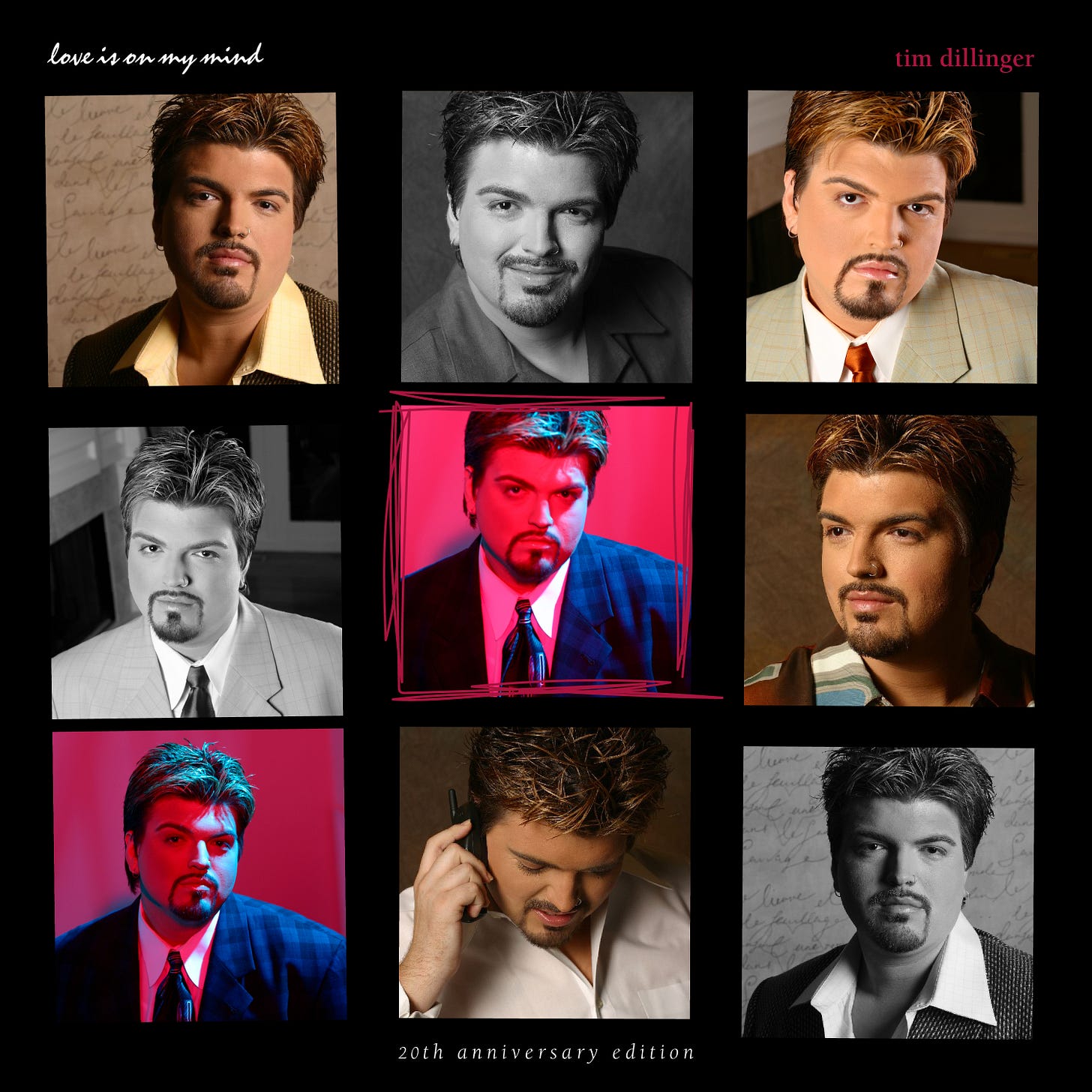
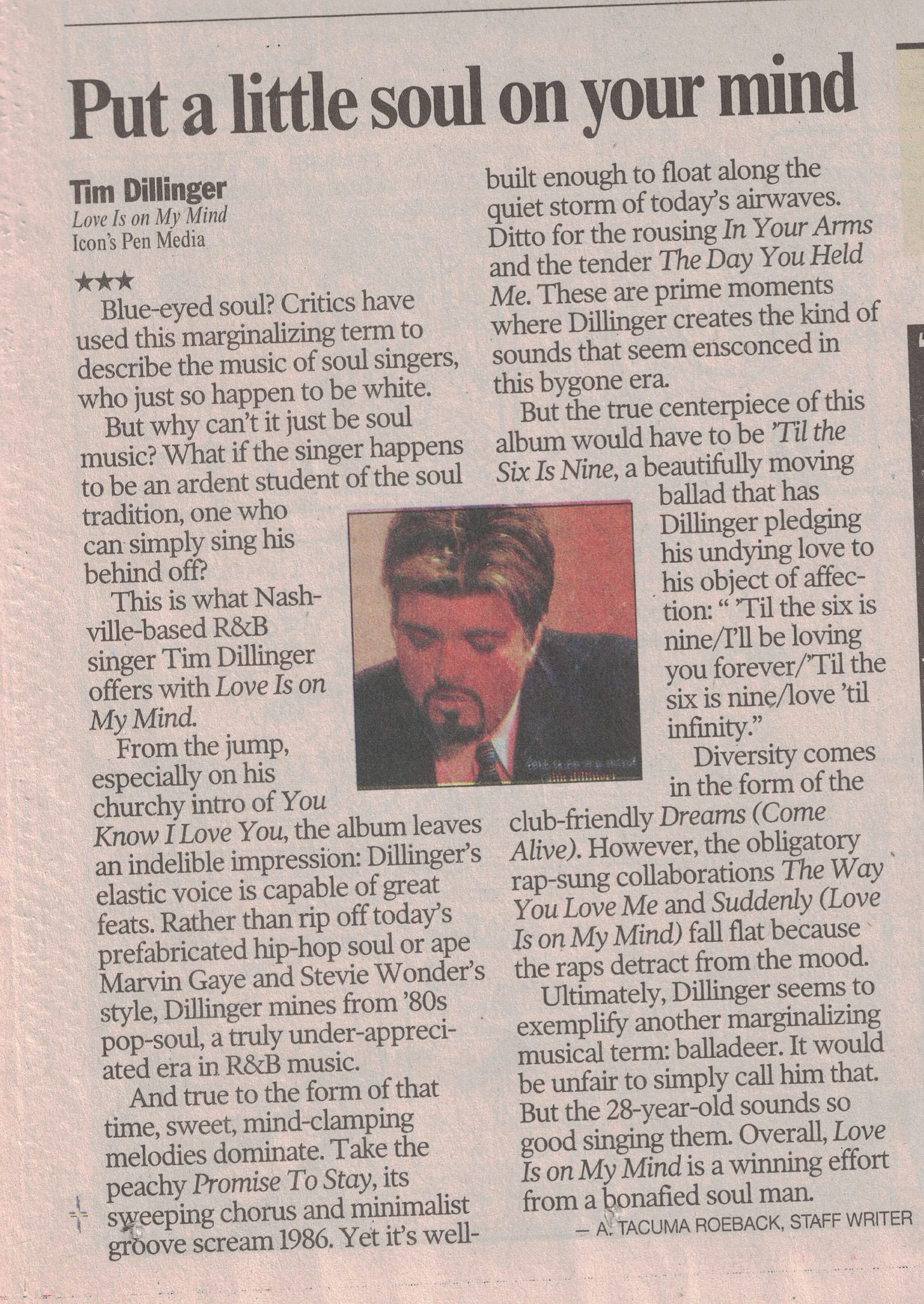
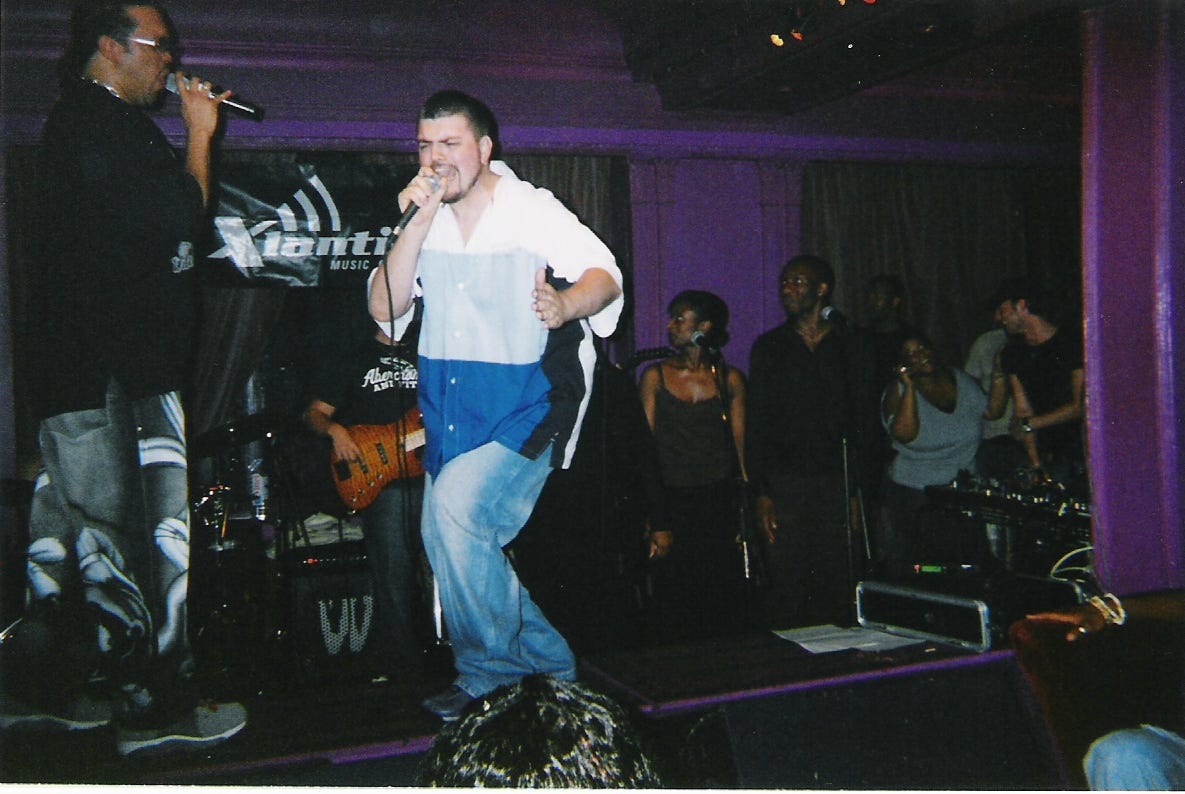

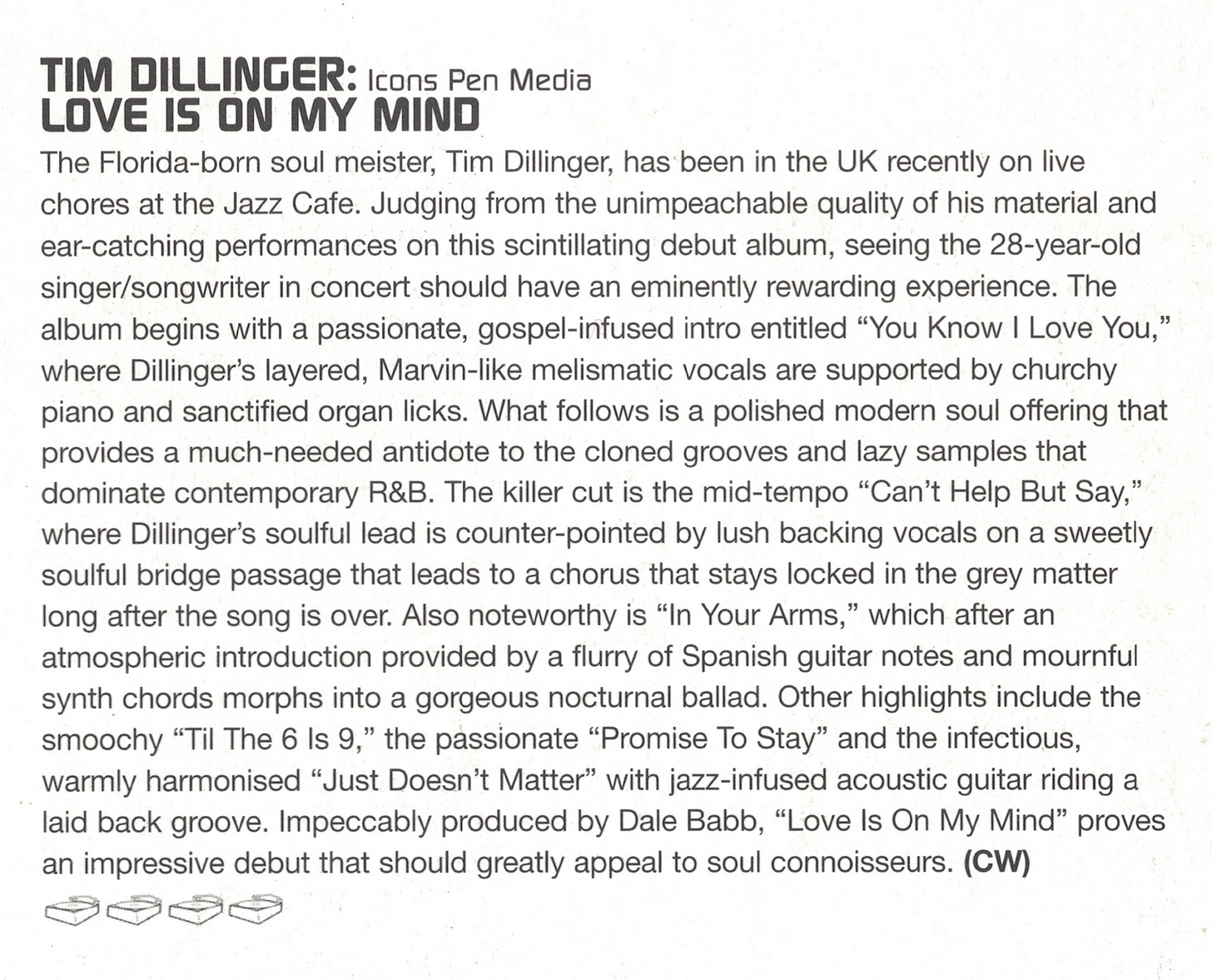
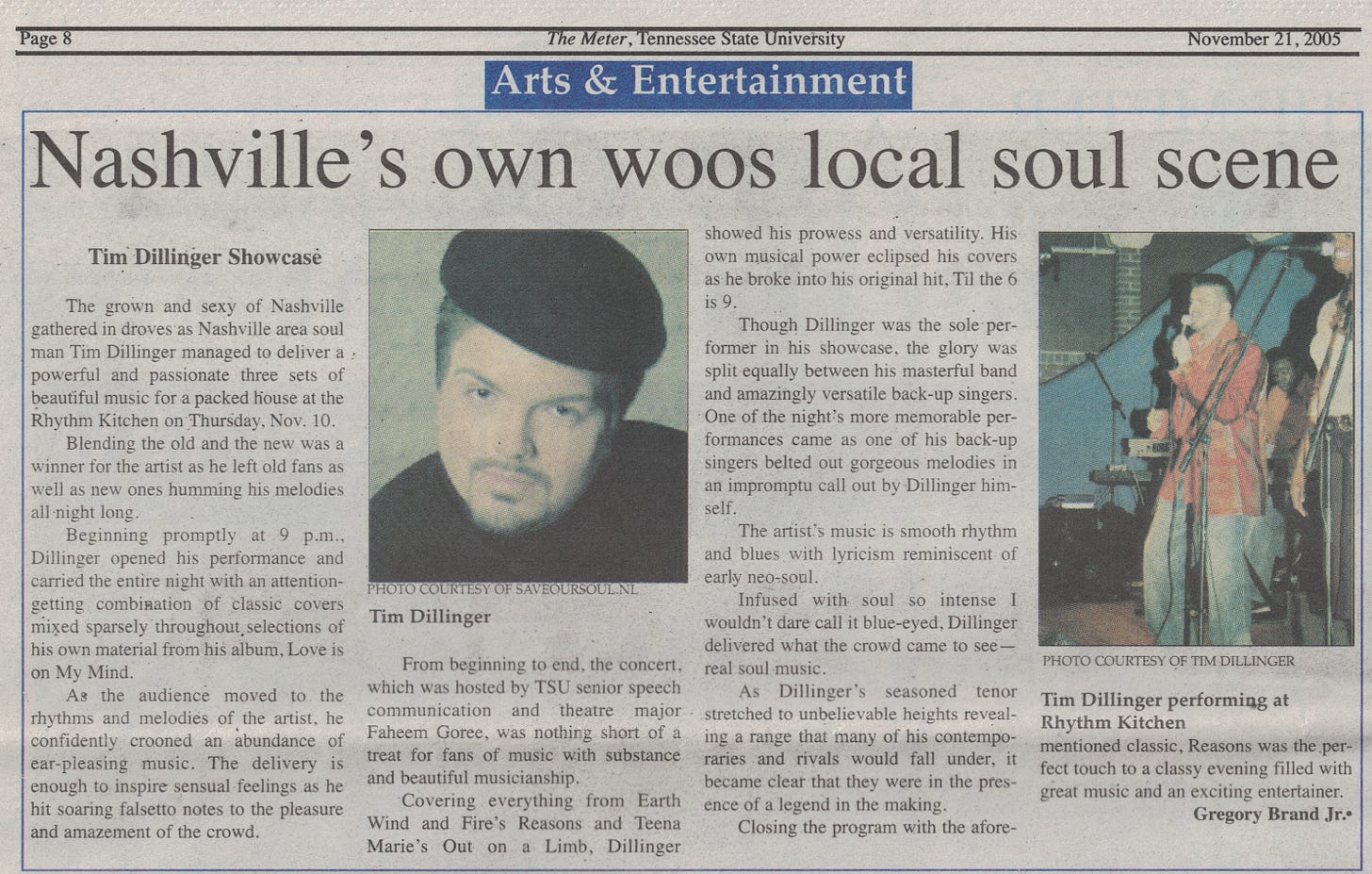
"The Day You Held Me" is a beauty-- so great to hear your voice. A great piece of writing and beautiful performance!
I just posted on FaceBook (pasted below): But wanted to say thank you for telling your story--and the stories of so many artists--here. You exemplify both virtuosity and generosity. You and your music have always touched my soul. I know some of the story and the reasons why you turned your attention in directions other than the recording studio and the stage. I still want to say with all my heart: Sing, Tim!!!!!
"Love this album! Love you! I am trying to figure out digital purchasing. Will persist. Right now I want to offer my memories. You sent me this album before we met. As soon as I heard your voice, something in me said "I remember!" When we met in Harlem not long after that, your first face to face words to me were "I remember!" So began--or resumed--a deep soul friendship that will last for all our lives. Thank you, dear combrogo. We love you forever!"